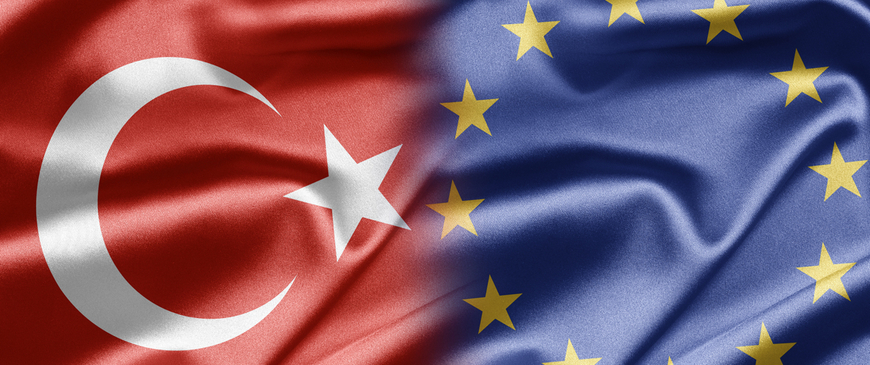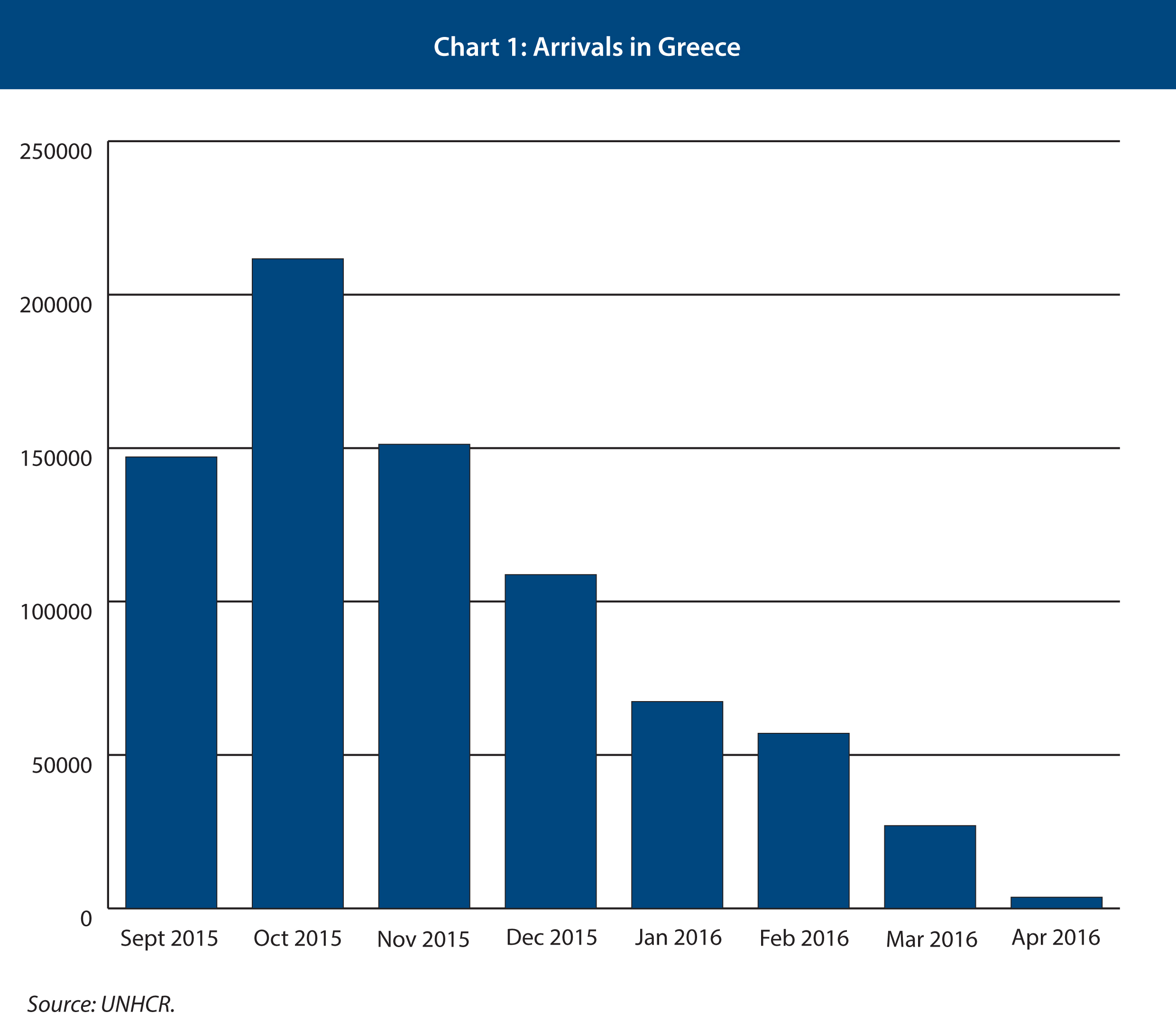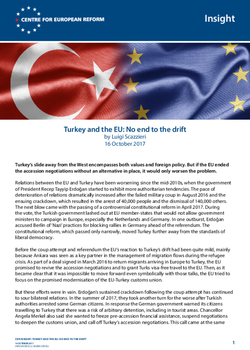
Turkey and the EU: No end to the drift
Turkey's slide away from the West encompasses both values and foreign policy. But if the EU ended the accession negotiations without an alternative in place, it would only worsen the problem.
Relations between the EU and Turkey have been worsening since the mid-2010s, when the government of President Recep Tayyip Erdoğan started to exhibit more authoritarian tendencies. The pace of deterioration of relations dramatically increased after the failed military coup in August 2016 and the ensuing crackdown, which resulted in the arrest of 40,000 people and the dismissal of 140,000 others. The next blow came with the passing of a controversial constitutional reform in April 2017. During the vote, the Turkish government lashed out against EU member-states that would not allow government ministers to campaign in Europe, especially the Netherlands and Germany – even referring to alleged ‘Nazi’ practices. The constitutional reform, which passed only narrowly, moved Turkey further away from the standards of liberal democracy.
The EU’s reaction to Turkey was initially quite mild, above all because Turkey was seen as a key partner in the management of migration flows during the refugee crisis. Indeed, within the context of the March 2016 deal with Turkey, the EU promised to revive the accession negotiations and to grant Turks visa-free travel to the EU. Later on, as it became clear that it was impossible to move forward even symbolically with the accession negotiations, the EU tried to focus on the promised modernisation of the customs union.
But these efforts were in vain. Erdoğan did not ease his crackdown. In the summer of 2017, EU-Turkey relations took another turn for the worse with Turkey’s arbitrary arrest of some German citizens. This led the German government to advise its citizens not to travel to Turkey and even prompted Chancellor Merkel to state that she wanted to freeze pre-accession financial assistance, suspend negotiations to deepen the customs union, and call off Turkey’s accession negotiations. This call came at the same time as the European parliament passed a non-binding resolution to end the talks. These developments strained EU-Turkey relations to their limits.
The crisis in EU-Turkey relations is a symptom of Turkey's broader drift away from the West.
The crisis in EU-Turkey relations is a symptom of Turkey’s drift away from the West not only in terms of values but also in its foreign policy. Indeed, it is not just Turkey’s relationship with the EU that has been damaged. US-Turkey relations turned sour following Obama’s decision to start supporting the Syrian Kurds against ISIS in October 2014 – a move Turkey viewed as a betrayal. The US has provided extensive military support to the Democratic Union Party in Syria (PYD), using it as the core of a broader coalition of ‘Syrian Democratic Forces’. Turkey has been furious at this decision, given the PYD’s close association with Turkey’s Kurdistan Workers’ Party (PKK), which has fought a guerrilla conflict against the Turkish state since the 1980s. Though Turkish troops have clashed with the PYD in Syria, they have not affected its military advances against the so-called Islamic State and other groups. And the clearer it became that the PYD was the only serious fighting force in Syria that the US could support, the more support it received.
The clash over Syria policy has caused a deep rift in US-Turkey relations. The Turkish government regularly lashes out against the US. It insists that the US was behind the coup attempt, pointing to the Americans’ refusal to extradite Fethullah Gülen, a former close ally of Erdoğan. Hostility to the US runs deep in Turkey, and is not limited to the AKP’s core supporters. Polling by Pew highlights how 72 per cent of the Turkish public view US power as a major threat. Despite some warm words from President Trump towards Erdoğan, there has been no improvement in relations. Indeed, Trump has continued with the same policies as the Obama administration towards the Syrian Kurds.
Turkey has taken actions that harm its relationship with the US. It has reached a deal to purchase an S-400 air defence system from Russia, rather than a NATO alternative. This undermines the alliance, as the Russian system is not interoperable with NATO systems and will require a complement of Russian technicians to install and operate. In a less-well known move, in July the Turkish state TV station Anadolu Agency revealed the location of US secret positions in Syria, potentially putting American personnel at risk. And in early October, tensions broke out in the open as Ankara arrested US consulate employees in Turkey. The US stopped issuing visas to US citizens and Turkey retaliated in tit-for-tat fashion, with Erdoğan going as far as saying he no longer recognised the outgoing US Ambassador.
Tensions between the US and Turkey are unlikely to improve, and indeed will probably become worse. Turkey hopes that US support for the PYD will decrease once the so-called Islamic State is defeated. But this is not likely. The US will still need a capable partner on the ground to prevent a resurgence of IS and to keep in check the Syrian regime, Russia, Iran and Hezbollah. Turkey is unlikely to react positively to this.
Good relations with the EU and US are in Turkey’s self-interest. The country is economically dependent on the West, and Erdoğan's domestic popularity rests on Turkey’s economic success. But the government prioritises a different set of aims, driven by a socially conservative domestic policy agenda. Erdogan wants to reshape Turkish society and has been increasingly able to do so since the AKP dismantled the army’s power and consolidated its hold on the state. And in foreign policy, the AKP has increasingly turned to an agenda aimed at making Turkey into an influential regional power and characterised by anti-Western rhetoric.
In this international context, it is challenging for the EU to formulate a more effective policy towards Turkey. It may be tempting to formally suspend accession negotiations and put an end to what is no longer a serious proposition in the current context. But ultimately this would be a risky option. Talks are already de facto frozen. Formally suspending them or even ending them without an alternative framework in place would simply fuel the political dynamics pushing Turkey further away from the West, and most likely further empower Erdoğan to crack down on his opponents. Indeed, it is likely that he wants the EU to end talks, so that he can shift the blame. Turkey would become more unstable and unpredictable. And ending the accession process without an alternative in place would also undermine the still substantial pro-European forces in the Turkish population, showing them that EU membership really was off the table. Keeping the negotiations alive, on the other hand, maintains the hope that Turkey’s governance may one day return to a European path.
The EU has much more leverage on Turkey than vice versa. While the refugee deal is important in keeping numbers low, EU officials point out that it was the closure of the Balkan route that prompted numbers to fall, more than the March 2016 deal with Ankara. And Turkey’s importance as a foreign policy ally is diminishing as its equipment acquisitions and foreign policy choices undermine NATO.

NATO membership and closeness to the EU remain invaluable to Turkey. Its economic success, underpinned by foreign investment, is in large part based on the absorption of large parts of the acquis and membership of the EU customs union. If the deterioration of the rule of law should continue and lead to political instability, investors’ attention is likely to focus on Turkey’s widening current account deficit and high inflation. Meanwhile, NATO guarantees Turkey’s security. Ankara’s efforts to become a more important regional player have amounted to little. In fact Turkey is at odds with traditional partners – such as Egypt, Saudi Arabia and the UAE – who are annoyed by Ankara’s closeness to the Muslim Brotherhood and support for Qatar in its recent spat with Saudi Arabia. And, while Turkey has drawn closer to Russia and Iran, co-operating in diplomatic attempts to secure local ceasefires in Syria, those relationships remain adversarial at heart. Without NATO’s backing, Ankara could find that Moscow and Tehran’s attitude towards it would shift quite rapidly.
The EU should keep the accession process alive to avoid exacerbating a negative spiral.
The EU should keep the accession process alive to avoid accelerating the negative spiral in bilateral relations. At the same time it should attempt to formulate a new framework for a partnership with Turkey. If, as is possible, the EU moves towards a membership made up of several tiers, there would be space for countries to be associated with certain elements of the Union but not others – in other words some form of associate membership. Turkey could aspire to join an outer ring, perhaps with deep access to the single market but no freedom of movement.
The EU should make Turkey an ambitious offer going beyond the proposed modernisation of the customs union to include better access to its market in both goods and services and increased labour mobility. The proposal should be tied to strict conditionality, as the original customs union was in the mid-1990s. The idea would be to replace the accession process with something more palatable that could still harness positive energies. However, such a proposition would stand little chance of taking off if the accession process was simultaneously taken off the table. This is why it would initially have to run parallel to it. If at some stage negotiations on the new partnership made good progress, then the accession process could be terminated.
Ultimately, a constructive EU-Turkey agenda can only develop if Turkey alters its current course. This depends on the broader context of the relationship between Turkey and the West. But the EU can help reduce the risk of a complete breakdown in relations by looking past the failure of accession talks and developing new ways to work together.
Luigi Scazzieri is a research fellow at the Centre for European Reform.


Add new comment